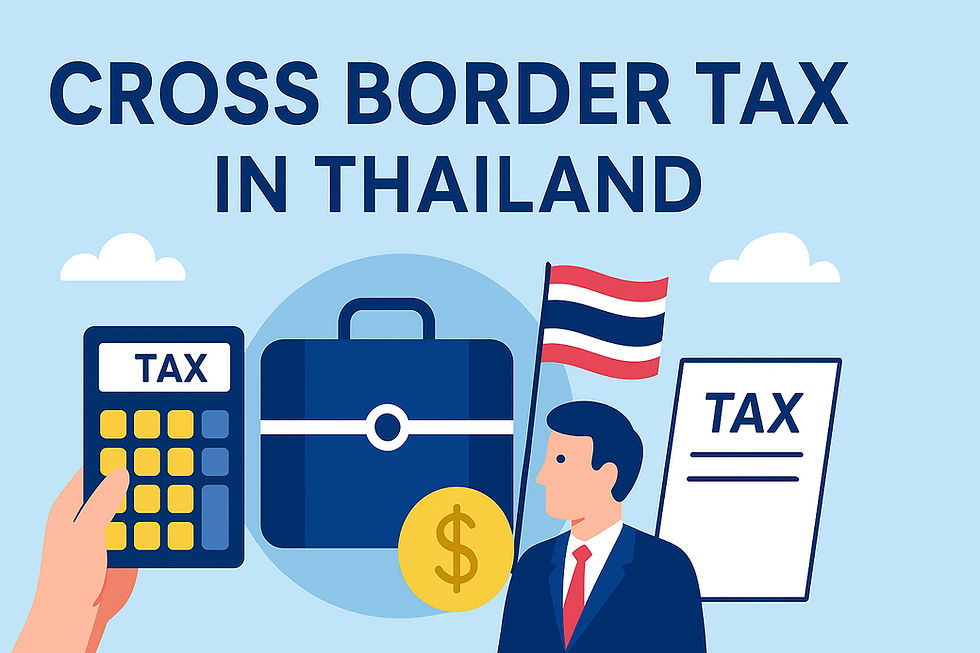Understanding Cross Border Tax Rules in Thailand
- interloop377
- Sep 9, 2025
- 2 min read
Introduction
Thailand is one of Southeast Asia’s fastest-growing economies, attracting investors, expatriates, and international businesses. With opportunities expanding, one key factor cannot be ignored—taxation. When money flows into or out of Thailand, special rules apply, known as cross border tax. Understanding these rules is essential for staying compliant and protecting your income.

What Is Cross-Border Tax in Thailand?
Cross-border taxation in Thailand applies when financial activities involve more than one country. This could include:
A Thai company exporting goods or services.
A foreign business earning income from Thai customers.
An expatriate living in Thailand but receiving income from abroad.
In all cases, the Thai Revenue Department sets clear regulations on how taxes should be paid.
Why Cross-Border Tax Matters in Thailand
Legal Compliance: Thailand has strict reporting requirements, and missing them can result in heavy penalties.
Financial Savings: With the right planning, you can avoid paying more than you need to.
Investment Security: Businesses and individuals can plan better when they know their tax obligations upfront.
Common Challenges
Double Taxation
One of the biggest concerns is being taxed both in Thailand and in another country for the same income.
Changing Rules
Thailand’s tax regulations are frequently updated, especially as the economy becomes more digital and globally connected.
Documentation
Taxpayers must provide accurate records, including contracts, invoices, and proof of payments, to support their claims.
Solutions and Strategies in Thailand
Double Tax Agreements (DTAs)
Thailand has signed tax treaties with many countries to avoid double taxation. These agreements ensure that income is not taxed twice, offering relief to both businesses and individuals.
Professional Guidance
Local tax advisors in Thailand are well-versed in domestic laws and international treaties. Working with one can help reduce risks and optimize tax payments.
Careful Planning
For businesses, structuring operations and transactions correctly from the beginning is the best way to avoid unnecessary tax burdens.
Real-Life Applications in Thailand
Foreign Companies: A company outside Thailand earning from Thai customers may have to pay withholding tax.
Expats in Thailand: An expatriate receiving income from abroad may need to declare it, depending on when the money is brought into Thailand.
Thai Exporters: Businesses selling products internationally must follow Thai tax rules for overseas income.
Future of Cross-Border Tax in Thailand
Digital Services Tax: Thailand is expected to strengthen tax rules for online platforms and services.
Greater Transparency: The government is aligning with international tax standards to prevent tax evasion.
Focus on Global Business: As Thailand attracts more foreign investment, cross-border tax rules will become even more important.
Best Practices
Review Thailand’s tax treaties before entering into international contracts.
Keep proper documentation for all overseas transactions.
Stay updated on Revenue Department announcements.
Seek expert advice when handling complex income sources.
Plan ahead for tax payments on income earned outside Thailand.
Conclusion
As Thailand continues to grow as a regional hub for trade, investment, and work opportunities, cross-border tax has become a key topic for businesses and individuals alike. By understanding the rules, making use of tax treaties, and seeking expert guidance, you can ensure compliance and safeguard your income.
Managing cross border advisory in Thailand may seem complex, but with the right knowledge and planning, it can be handled smoothly. Staying informed today means fewer problems tomorrow.



Comments